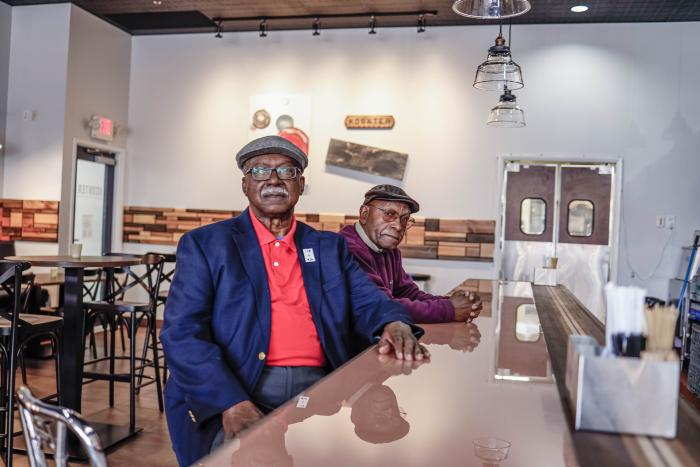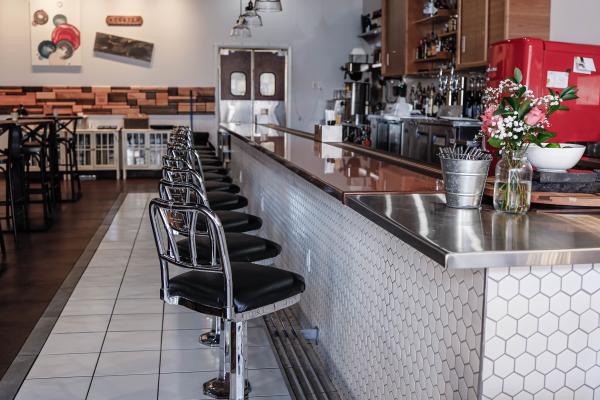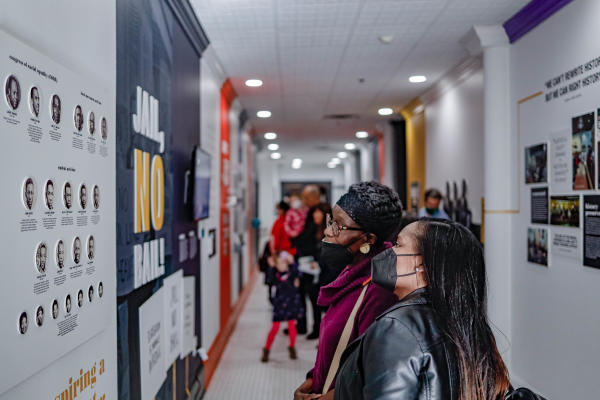In January of 1961, Rock Hill was about to be placed on the national stage for the Civil Rights Movement. For the past year, Friendship College in Rock Hill students were training for a peaceful sit-in to protest segregation under the leadership of CORE (Congress of Racial Equality) field organizer Thomas Gaither.
Sit-ins occurred at several Rock Hill lunch counters following the Woolworth lunch counter sit-in in Greensboro, North Carolina, a year prior. The first sit-in in South Carolina took place in Rock Hill on February 12th, 1960, organized by the local Friendly Student Civic Committee
On January 31st, nine students and Thomas Gaither, a Congress of Racial Equality (CORE) field secretary, walked nearly a mile from Friendship College to McCrory’s Five & Dime on Main Street. While the planned sit-in was not publicized, the Friendship 9 stated that the streets were lined with officers, including state law enforcement, encouraging them not to enter and start trouble. The ten entered McCrory's two at a time, being arrested after immediately sitting down.
Nine then-men declined to pay the $100 in bail and were jailed for thirty days at the York County Detention Center. For the next thirty days, the men were forced to work hard labor on the chain gang, placed in solitary confinement, and even created a barbed fence in preparation for the mass amounts of visitors to the detention center.
Read "Jailed-In," a first-hand account of the sit-in and time in jail, written by Thomas Gaither for CORE in April of 1961 here.
As news spread of the nine men being jailed, protesters would flock to Rock Hill. Four students with the Student Non-violent Coordinating Committee (SNCC), including Diane Nash, would come to Rock Hill and participate in the Jail, No Bail sit-in. The jail conditions for the men made national headlines, with telegrams reaching President John F. Kennedy's desk.
The phrase “Jail, No Bail” emerged, and the tactic began being used across the Southeast. It became extremely valuable during the Freedom Rides, which would stop in Rock Hill a few months later.
The nine men had the charges vacated from their record in 2015 by the judge's nephew of the original sentences. The former McCrory's building has been named a stop on the United States Civil Rights Trail and the National Parks Service African American Civil Rights Network.
Walk in the Footsteps of the Friendship 9 and City Girls:

You can follow history’s path by visiting the following locations below:
Start at Friendship College
While Friendship College closed its doors in 1981 and was later torn down, the fence and signage for the college remain. Visiting this location gives you a sense of where these men started their walk on January 31st to get to the lunch counter. There is a memorial here honoring those men by the church as well.
Visit the Lunch Counter
After McCrory's closed their doors in 1997, the original lunch counter was at risk of being sold and removed. A local organizing committee raised $30,000 from the Museums of York County and the City of Rock Hill to preserve the counter. A base was built around the original counter, and the stools and footrails were restored and remained in the diner for two separate restaurants. In 2020, a new restaurant, Kounter, renovated the space and restored the original lunch counter. Today, you can view the lunch counter's original surface, protected by a special epoxy. In addition to restoring the counter, the restaurant also etched the name of the nine and supporters into designs inside the restaurant.

Read the Historical Marker
A state historical marker outside the diner’s space stands on Main Street for visitors to read about the sit-in and the Friendship 9’s impact on segregation and the Civil Rights Movement.
Jail, No Bail Exhibit
This brand-new exhibit is in the hallway next to Kounter at 135 E Main St, the Jail, No Bail: How 30 Days Impacted the Civil Rights Movement. It captures their protest's unique role in the 1960s civil rights movement. Through original letters, newspaper articles, images, and video, this exhibition tells the story of a group of individuals who altered the course of civil rights together. Hours: Tuesday - Friday, 10 am - 4 pm; Saturday - Sunday, 11 am - 4 pm every January 31st for the anniversary of the sit-in.

Walk Freedom Walkway
Visitors can also walk down the Freedom Walkway, an alley steps from the diner on Main Street. This walkway holds a mural that honors the history of the social justice strides that have been made in the Rock Hill community. You can find the meanings of the pieces within the mural here. At the end of the alley, you’ll find descriptions of those who were integral to making change.
To learn more about The Friendship 9, click here.
- Phyllis Thompson Hyatt
- Peggy Archie Long
- Olivette McClurkin
- Essie Porter Ramseur
- Lucille Wallace Reese
- Patricia Hinton Sims
- Elsie White Springs